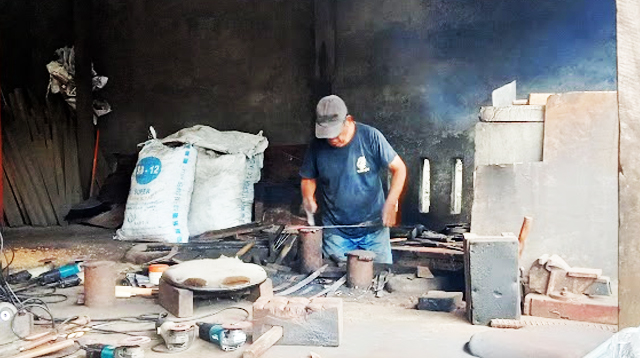NESTLED amidst the lush landscapes and vibrant cultural tapestry of Bali, lies an age-old craft that continues to thrive—the art of blacksmithing. While Bali is often celebrated for its stunning beaches and vibrant ceremonies, its blacksmiths play an essential role in preserving traditions and producing intricate metalwork that adds to the island’s unique charm.
If some people tend to deeply involve in modern professions, some others are even very loyal to preserve their ancestral legacies. Commonly they belonging to pande clan (blacksmith). They are spread across Bali.
Legacy of Balinese Blacksmiths
The tradition of blacksmithing in Bali dates back centuries and holds a special place in the island’s heritage. These skilled artisans are responsible for crafting a wide array of products, from ornate temple gates and statues to essential farming tools. Their craftsmanship embodies the essence of Bali’s rich cultural history.
Mastering the Craft
Becoming a Balinese blacksmith is no simple feat. Apprenticeships often span several years, with young smiths learning the intricacies of metalwork, heat treatment, and traditional designs. This hands-on education ensures that the techniques and knowledge are passed down from generation to generation.
Artistry in Iron and Steel
One of the remarkable aspects of Balinese blacksmithing is the fusion of artistry and functionality. The island’s blacksmiths create not only utilitarian items but also stunning works of art. Elaborate carvings, intricate patterns, and meticulous attention to detail characterize their creations.
Bali’s Metalwork in Daily Life
The products of Balinese blacksmiths are woven into the fabric of daily life on the island. From the traditional Kris daggers that are a symbol of Balinese culture to the various tools used in agriculture, these blacksmiths provide essential contributions to the community.
In the past, kris daggers were used as weapon by imperial soldiers, aside from sword, and others. Meanwhile today, they are widely used as accessories of traditional drama and arja operetta players as well as Balinese grooms.
Preserving Tradition in a Modern World
While modernization has touched nearly every corner of Bali, the blacksmiths remain steadfast in preserving their craft. Many workshops and family-owned forges continue to produce metalwork using time-honored techniques. This commitment to tradition ensures that future generations will also have the opportunity to appreciate the artistry of Balinese blacksmiths.
Visiting Blacksmith Workshops
For travelers interested in experiencing the world of Balinese blacksmiths firsthand, several workshops and studios welcome visitors. Here, you can witness the age-old techniques, interact with skilled artisans, and even purchase unique metalwork souvenirs. For instance, there is a blacksmith in Sangeh Village, near monkey forest. He often receives the visit of tourist wishing to see his workshop.
In the enchanting Island of Bali, where ancient traditions blend seamlessly with modernity, the blacksmiths stand as guardians of a rich cultural heritage. Their dedication to preserving and advancing their craft ensures that the legacy of Balinese blacksmithing continues to shine as brightly as the island’s sunsets.
The artistry, skill, and passion of these blacksmiths are a testament to the enduring spirit of Bali’s cultural traditions. So, the next time you visit this island paradise, take a moment to appreciate the intricate metalwork that adds a touch of artistry to Bali’s captivating landscape.











